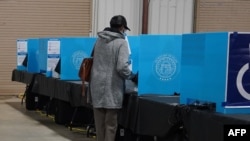Early voting is under way in the U.S. southern state of Georgia for two Senate seats for which none of the candidates received a majority of the vote in the November election. At stake in the January 5 runoff vote — the balance of power in the U.S. Congress.
Both U.S. President Donald Trump and President-elect Joe Biden have focused their energies on the races. Trump told a December 5 rally in the state that "the voters of Georgia will determine which party runs every committee, writes every piece of legislation, controls every single taxpayer dollar," as he urged support for incumbent Republican Senators Kelly Loeffler and David Perdue.
He plans to hold another rally on January 4 in Dalton, Georgia.
Biden has campaigned for Democratic candidates Raphael Warnock and Jon Ossoff, telling voters on December 15 to "send me these two men, and we will control the Senate and will change the lives of people in Georgia."
Both races are competitive. Warnock is essentially tied with Loeffler. She was appointed to her seat by the state's governor to replace Senator Johnny Isakson, who retired a year ago for health reasons.
The race between Ossoff and Perdue is also tight. Perdue was elected in 2014, and Ossoff has closed the gap to achieve a virtual tie in recent polling.
Power in the U.S. Congress has been divided. Democrats continue to hold a majority in the House of Representatives, and the January 5 Georgia vote will give either party control of the Senate.
"If the Democrats can pull off two victories, there will be 50 Republicans and 50 Democrats — a tie," said political analyst Sherry Bebitch Jeffe.
Tie-breaking votes would be cast by Democrat Kamala Harris, the next vice president, who will preside over the Senate. Democrats need to win both seats to gain control, and Republicans need just one.
Biden reversed recent voting patterns in November, winning Georgia by a fraction of a percent, while the two Democratic Senate candidates forced runoffs by preventing the incumbents from reaching the threshold of 50% plus one vote.
"That was a gigantic victory for Democrats," said Raphael Sonenshein, executive director of the Pat Brown Institute for Public Affairs at California State University, Los Angeles. "Even though it's a long shot for the Democrats to win both seats, it's a sign that Georgia is moving the way that other parts of the South may be heading — toward a new coalition."
He said Georgia, like the southern states of Virginia and North Carolina, has seen an influx of college-educated voters, who tend to vote Democratic.
"The African American population, Latino population, Asian American population got larger in those states," said Sonenshein, leading to what he said is a more progressive electorate.
Still, Jeffe said, the Senate contest will come down to who gets out the vote.
"The Democrats are moving strongly with regard to a shoe leather campaign, knocking on doors, even in a pandemic," she said, noting that Republicans lead in fundraising.











